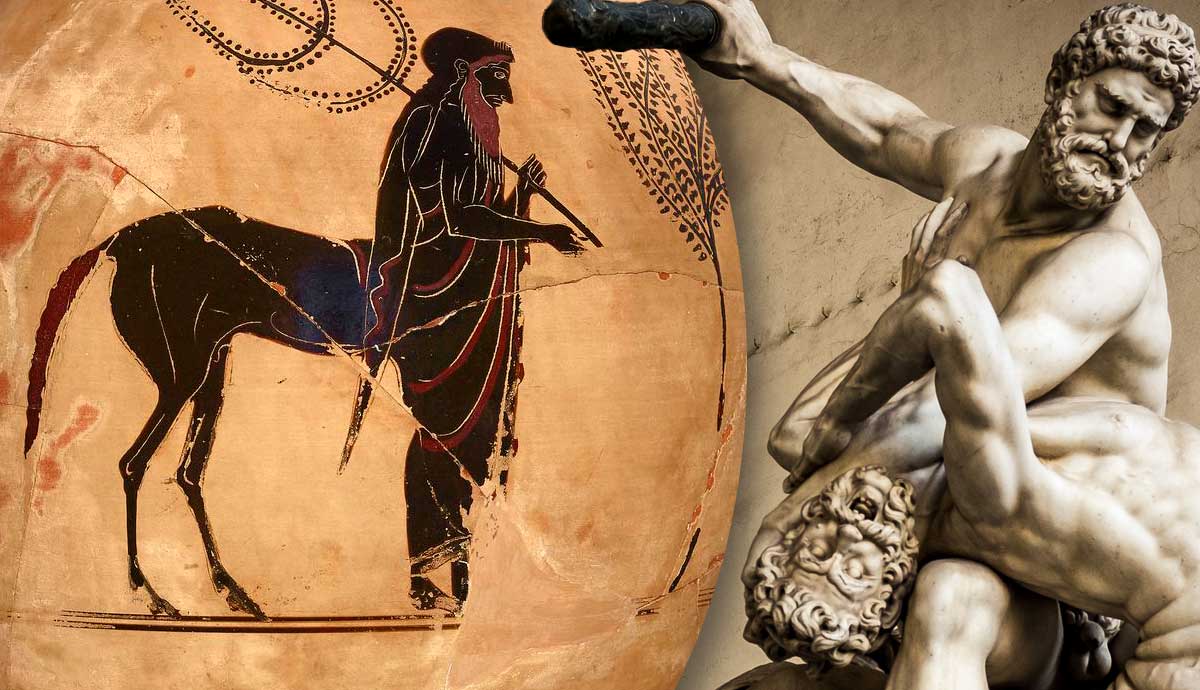
A centaur is a mythical creature derived from Greek mythology, which is half-man, half-horse. As featured in stories and art through the centuries, centaurs generally have the body of a horse and the torso, head and arms of a man. In Greek myth centaurs inhabited the wild forests and mountains of Thessaly, beyond the land of humankind. This setting was best-suited to the centaurs, who by nature were wild and barbarous, with little to no self-control, and a taste for wine and worldly pleasure. Centaurs appeared frequently in Greek pottery, relief carvings and sculpture, often twisting and contorted into violent battle scenes. Through the centuries centaurs have remained a symbol of chaos, and have often appeared in fantasy stories and films. Let’s take a brief look at their history and evolution.
Half Man, Half Horse

The ancient Greeks were among the first civilizations to write about the concept of a half-man, half-horse being. However, the idea may be much older; some believe the concept of a half-man, half-horse came about when non-riding societies saw people riding horseback for the first time, and mistook them for strange, hybrid breasts. In stories and art they did not always appear the same, taking on various different human-horse hybrids over the centuries. Some have included wings and horns, while others even had six legs, with a full man attached to the front of the horse. But the most widely popularized version of the centaur, as described in Greek culture, is the four-legged beast with the upper body, arms and head of a man. Keeping up with tradition, this stylized look continued throughout Greco-Roman society.
A Symbol of Barbarism and Chaos

As with many mythological characters, centaurs came to symbolize certain characteristics of humankind. They had a particular weakness for wine, which, when consumed, would turn them into reckless barbarians capable of wanton destruction. As such, they represented man’s wrestle between animalistic drive and the need to behave as part of civilized society. However, they were not evil, but merely uncontrollable forces that struggled to fit in with the rigors and rules of human life. This meant centaurs generally avoided contact with humans, aside from the exceptional few.
Centaurs Appeared Frequently in Greek Mythology

Centaurs appear throughout Greek mythology, often in tales filled with chaos and instability. Their story of origin is often traced back to an unwitting affair between Ixion, king of the Lapiths, and the nymph Nephele. This union led to the birth of a beastlike creature called Centaurus, a wanton, brutish character with poor social skills. After leaving human society for the mountains of Thessaly, Centaurus procreated with mares in the wilderness, thus leading to the creation of centaurs. In another version of the story, Centaurus was the son of Greek god Apollo and the nymph Stilbe.
One of the best-known stories featuring centaurs at the center is the Centauromachy, a violent conflict between the centaurs and the Lapiths. After an arduous fight, the centaurs eventually lost, leading them to be driven away from their home in Mount Pelion.
Some Were Better Known than Others

Various centaurs stood out in Greek mythology as characters of note, whose behavior was different from most of their kind. Chiron, the best-known, was remarkably kind and educated. He taught and trained several men who would become great Greek heroes including Jason, Asclepius and Hercules. Pholus was another remarkable, wise centaur who took care of Hercules. Both Chiron and Pholus stood out from the other centaurs because they were not descended from the same common ancestor as the other centaurs, having been born instead from divine unions.
Centaurs Remain Popular Today in Fantasy Fiction

Throughout the centuries centaurs have remained a recurring character trope within fantastical stories and artworks. Examples include Shakespeare’s The Comedy of Errors, 1524, C.S. Lewis’s The Chronicles of Narnia, 1950-1956. They have also appeared more recently in J K Rowling’s Harry Potter series, from 1997 to 2007, and Rick Riordan’s Percy Jackson series from 2005 to 2009. Centaurs in popular fiction and film are generally benevolent characters who protect human beings, deviating from the ancient Greek tradition.










